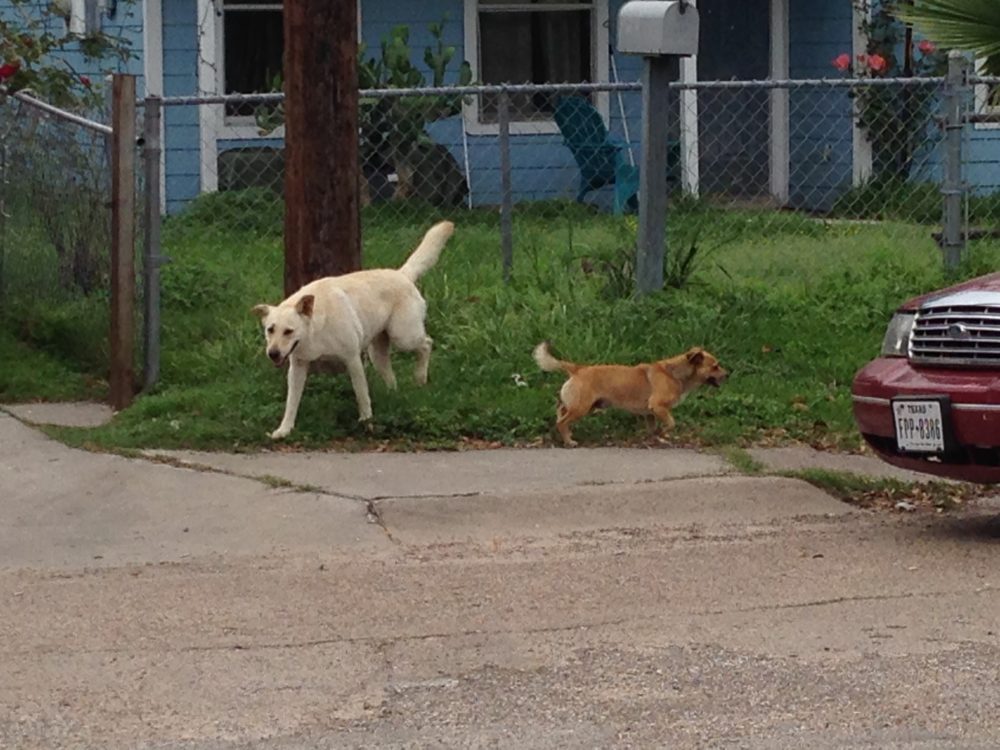
Houston's stray animal and overcrowded animal shelter problems continue to be a concern for many, including mayoral candidates, who blame the lack of funding and limited attention for the problem and said animal welfare should be a top priority.
The influx of stray animals roaming Houston streets has been a challenge for officials and animal shelters. BARC, the city's leading shelter, has been overcrowded for several years with increased call volumes that have resulted in a higher intake of stray animals.
"We have 7,000 more calls for service and that resulted in a 40% increase of animals being brought in by our own enforcement team," said Cory Stottlemyer, spokesperson for BARC. "That has a cascading impact when outcomes aren't improving, when outcomes for adoption, rescue pulls, and foster outcomes, are all staying the same and not increasing."
Stottlemyer said intake is anywhere from 70 to 100-plus animals coming in on a given day. He said the total intake for the fiscal year 2023 was 19,000 — putting the shelter close to pre-pandemic numbers.
Mayoral Forum
Houston Petset, a non-profit that helps to end animal homelessness and supports animal shelters and rescues in Houston hosted a mayoral forum on September 25 ahead of the November election. State Sen. John Whitmire, U.S. Rep. Sheila Jackson-Lee, District I City Council Member Robert Gallegos, and former METRO Chair Gilbert Garcia were in attendance – each candidate framing how they would tackle the stray animal issue along with current legislation or policies they have already championed to put in place.
Whitmire, Jackson-Lee, and Gallegos touted their roles in pushing state and local initiatives. Whitmire touted his role and getting endorsed by the Texas Humane Legislation and sponsoring HB-589, which prohibits anyone previously convicted of animal cruelty from possessing an animal for five years. Jackson-Lee, who said in Congress she’s known to be a "champion" of animal welfare, introduced legislation regarding the changes to the Endangered Species Act. Gallegos said in his first two years on council he got BARC an extra $2.4 million under former Mayor Annise Parker's administration in 2014 after the city hadn't increased spending for BARC in years, and he brought Emancipet to Houston.
Despite each candidate’s local or state-wide initiatives on the issue, they all saw a need for increased funding. A recent poll released by the Hobby School of Public Affairs found 12% of local voters said animal adoption and control should be a top priority for the next Houston Mayor.
Problems and solutions for strays
Whitmire said in order to reach those "untapped" resources, the city has to bring the issue of animal welfare to the forefront.
"You’re not going to solve a problem in government unless you admit you have a problem," he said. "You can’t have a city administration, which we’ve experienced recently said everything’s okay, but you and I know if you go out to BARC, it’s a broken system."
Jackson-Lee said if elected, she plans to implement a task force that's specially trained to deal with stray animals on the streets. She said one reason the city could be struggling to grapple with the issue is due to the limited partnership with Harris County – which is also battling to keep its streets cleared and shelters at low capacity.
"I have excellent relationships with the county judge and the county commissioners on that court, and I look forward to being able to collaborate with them," she said "[There’s] no reason why our two entities that deal with animals, and the need for expanded services cannot work together."
Gallegos, who’s been on council for ten years said BARC just reached funding that totals almost $15 million. He said if he was the Mayor now, he would be meeting with the state senators and representatives about getting resources from the state’s $32.7 billion surplus. Gallegos said the city also needs more veterinarians to conduct spay and neuter services.
"Harris County is supposed to have seven veterinarians, they just have two and hired a third one that will start in December," he said. "The city of Houston is supposed to have four veterinarians, and we just have two – Emancipet has a shortage of veterinarians."
Houston has 2.3 million people and spent $13.5 million on animal control in Fiscal Year 2023, while other major cities like San Antonio spent $21.4 million, and both Austin and Dallas contributed about $18 million to their animal control services.
Lisa Tynan is the Marketing and Special Events Specialist with Houston Petset. While her organization assists other shelters and rescues in the city, they also play a major role in getting animals out of overflowing shelters.
"We have a transport program that takes animals who are here in Houston shelters and rescues who are having difficulty finding a new home, and we transport them up to rescue partners in Minnesota, where they have a much better chance of getting adopted," she said.
Tynan said her organization has donors who provide them with the resources to ship animals, but the money could go a long way in Houston.
"It costs us many thousands of dollars every time we transport animals from Houston up to Minnesota," she said, “We want to be able to use that money to focus on the problem here in Houston rather than by essentially outsourcing it to other states."
Tynan said there is also a correlation between animal suffering and people suffering.
"The stray problem is worse in underserved neighborhoods not for a lack of care or compassion," she said. "It’s because when people are suffering, they have to prioritize the problems that they’re able to deal with and we don’t blame anybody for feeding their children before they feed their pet."
Gallegos also mentioned how the lack of resources for underserved communities can alter what families choose as financial importance at the moment.
"When you have families that have to pay their light bill, have to put food on their table, have to put clothes on their kids – getting their dogs and cats spayed and neutered, unfortunately, is the last thing on the list to get done."
Gallegos is the only candidate that brought up Houston's revenue cap as to why the city has not been able to collect $1.8 billion in property taxes.
"We need to educate the voters to hopefully repeal the revenue cap," he said. "It saved the average homeowner about $100- $150 a year. I would have rather spent that $100 to know I have more police officers on the street, more ambulances if needed for emergencies, and more more animal control code officers that way people can actually walk the street without fear that a stray dog will come and attack them."
A report by the U.S. Postal Service ranked Houston as the number one city for the most dog attacks on mail carriers.
Garcia agreed animal welfare needs more attention in order to get additional funds, but other city issues might take the bulk of the city's finances.
"’I’m not going to mislead folks because the city of Houston is going to face some very difficult financial circumstances here going forward," he said. "The number one issue is we have to make the city safe again, people don’t feel safe. We’ve got to solve our firefighter issue; the will of the voters spoke several years ago – that’s going to change the finances."
The City of Houston has made some strides, like mandatory microchipping, reducing adoption fees and extending adoption hours. Houston voters also approved a $47 million bond to build BARC a new facility.

 84 °F
84 °F
